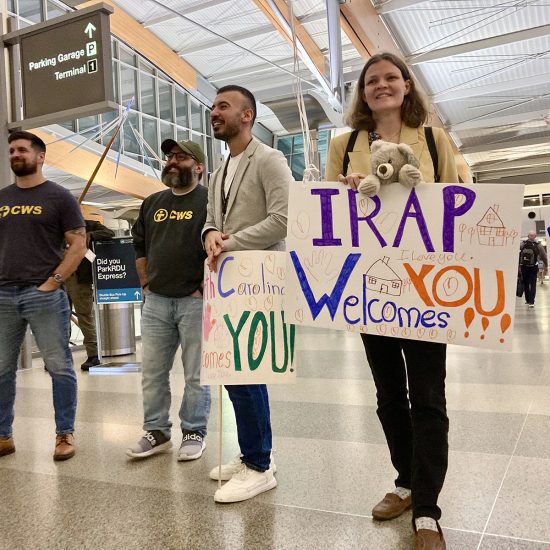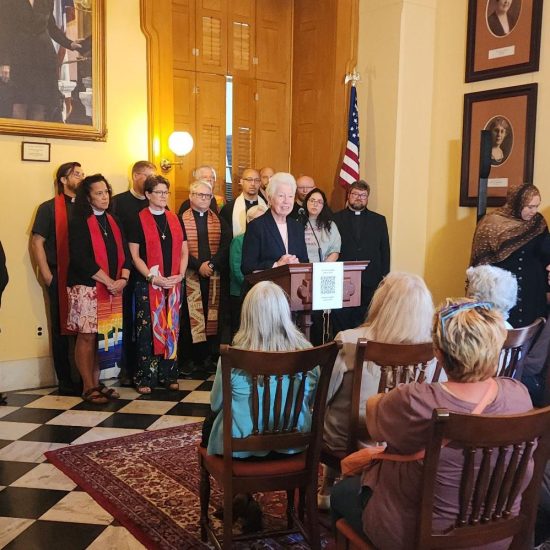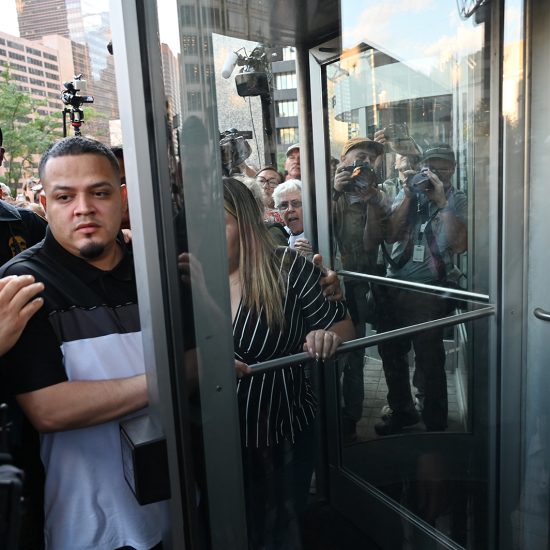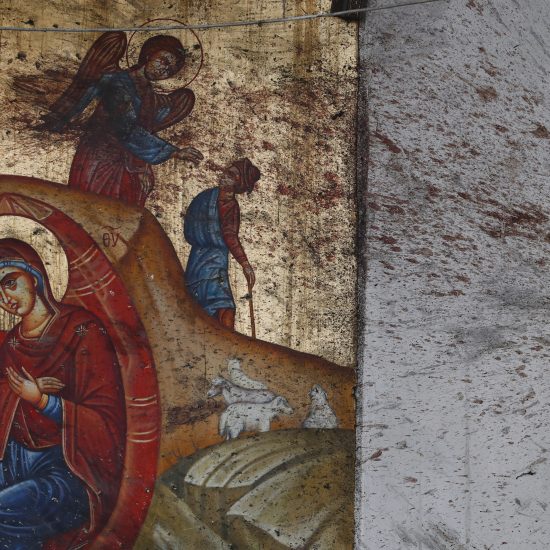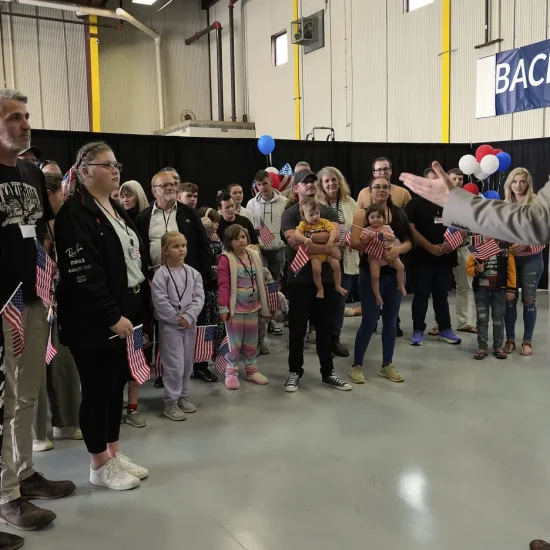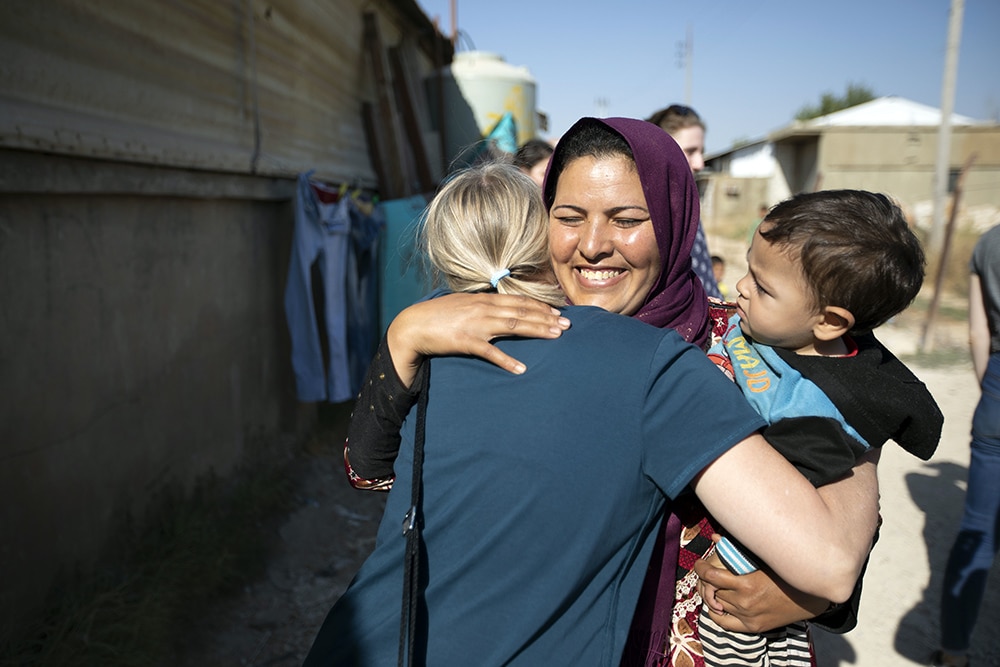
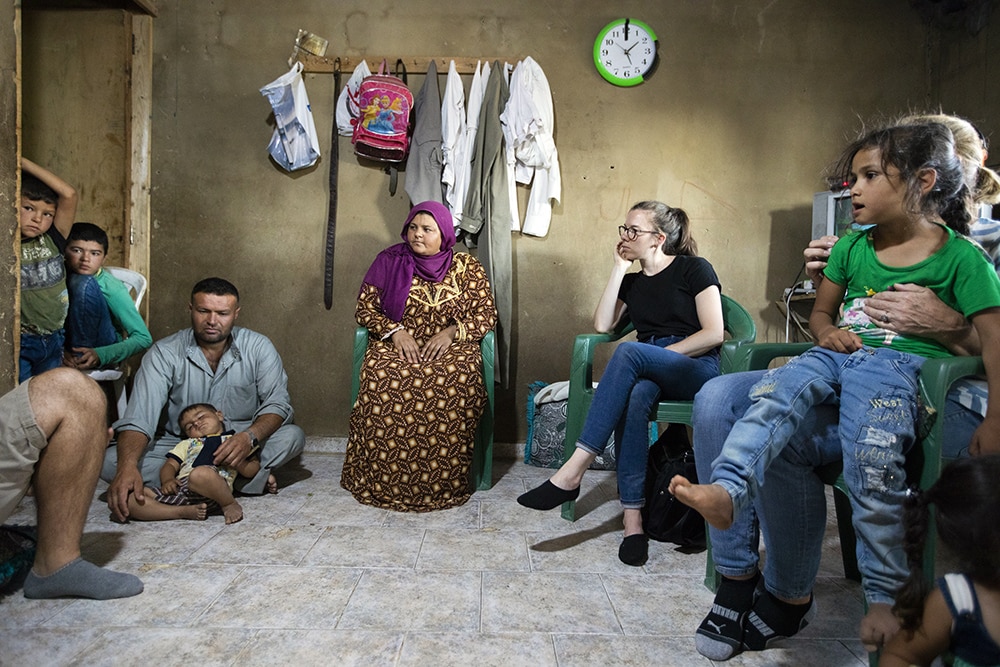
Exodus World Service volunteers visit with Syrian refugees during a visit to Lebanon in Sept. 2019. Photo by Heidi Zeiger
CHICAGO (RNS) — “I didn’t used to live like this.”
The words resonated with Elizabeth Shuman. The speaker — a woman dressed in beautifully designed fabrics, a scarf covering her hair — had invited Shuman and other volunteers into her home in Lebanon and taken great care to show them hospitality.
But the home was a tent made from tarps, insulated against the crisp air as best as possible.
The woman and her family were refugees from Syria and the tent housed all the belongings they had remaining.
It was a moment of connection for Shuman, who could see herself in the woman’s place.
“I value serving people well. I like to make tea for people. And I was imagining, what would it be like if I didn’t have my grandma’s teapot that I could serve or didn’t have a special room that I could make tea for people in and just had to serve them wherever I was?” she said.
“It’s easy for us to think of refugees as ‘those people’ and not be able to think of ourselves in their position.”
The encounter was part of a pilot trip organized in February by Exodus World Service for volunteers to learn from Syrian refugees in Lebanon.
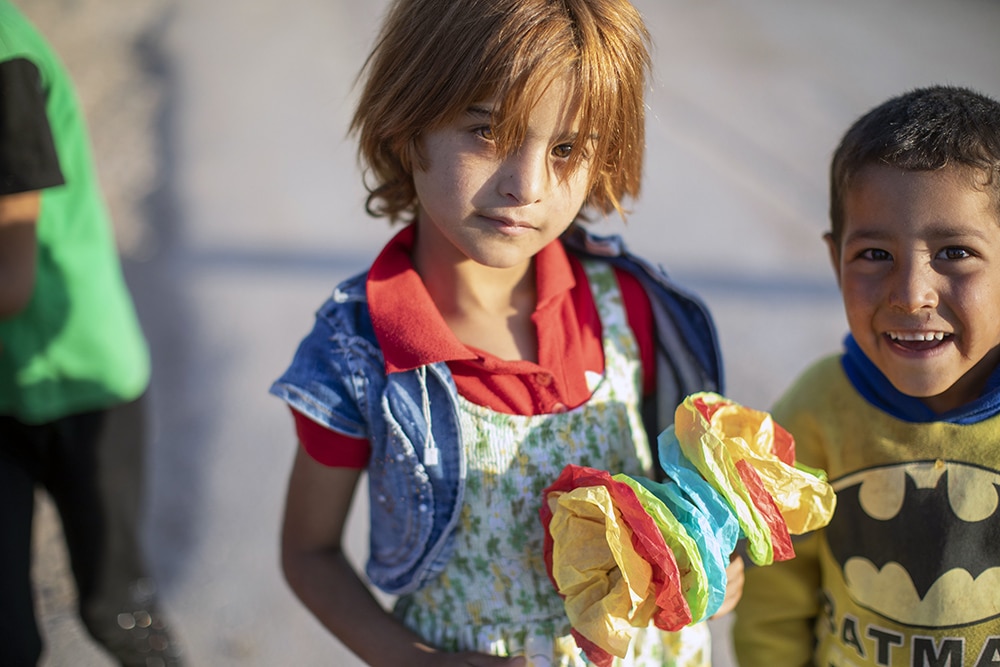
Syrian refugee children in Lebanon in Sept. 2019, during a visit from Exodus World Service volunteers. Photo by Heidi Zeiger
As fewer refugees are arriving in the United States, organizations that work with refugees — many of which are faith-based — are finding new ways to reach out to those who have been forced to flee their home countries.
That includes the nine agencies authorized by the U.S. government to resettle refugees, which have closed offices and laid off staff over the past few years. Six of those agencies are faith-based.
It also includes groups like Exodus, a Christian nonprofit based in the Chicago suburbs that works to build bridges between Christians and refugees who are resettled in the area.
Exodus hasn’t been decimated in the same way refugee resettlement agencies have — in fact, it’s grown, partly because of increased interest and awareness, according to the organization — but it also has shifted its programming. That means adding programming for refugees who have been in the U.S. longer.
The drop in refugees arriving in the U.S. also means Exodus now is going where the refugees are.
A team of eight Exodus volunteers recently traveled to Lebanon, where they met refugees, heard their stories and learned more in order to better advocate for them at home.
The volunteers also distributed food in tent settlements and partnered with another organization on the ground to lead a three-day Kids Club for refugee children.
And the organization started fundraising to support a classroom for those children after hearing requests again and again from parents for education.
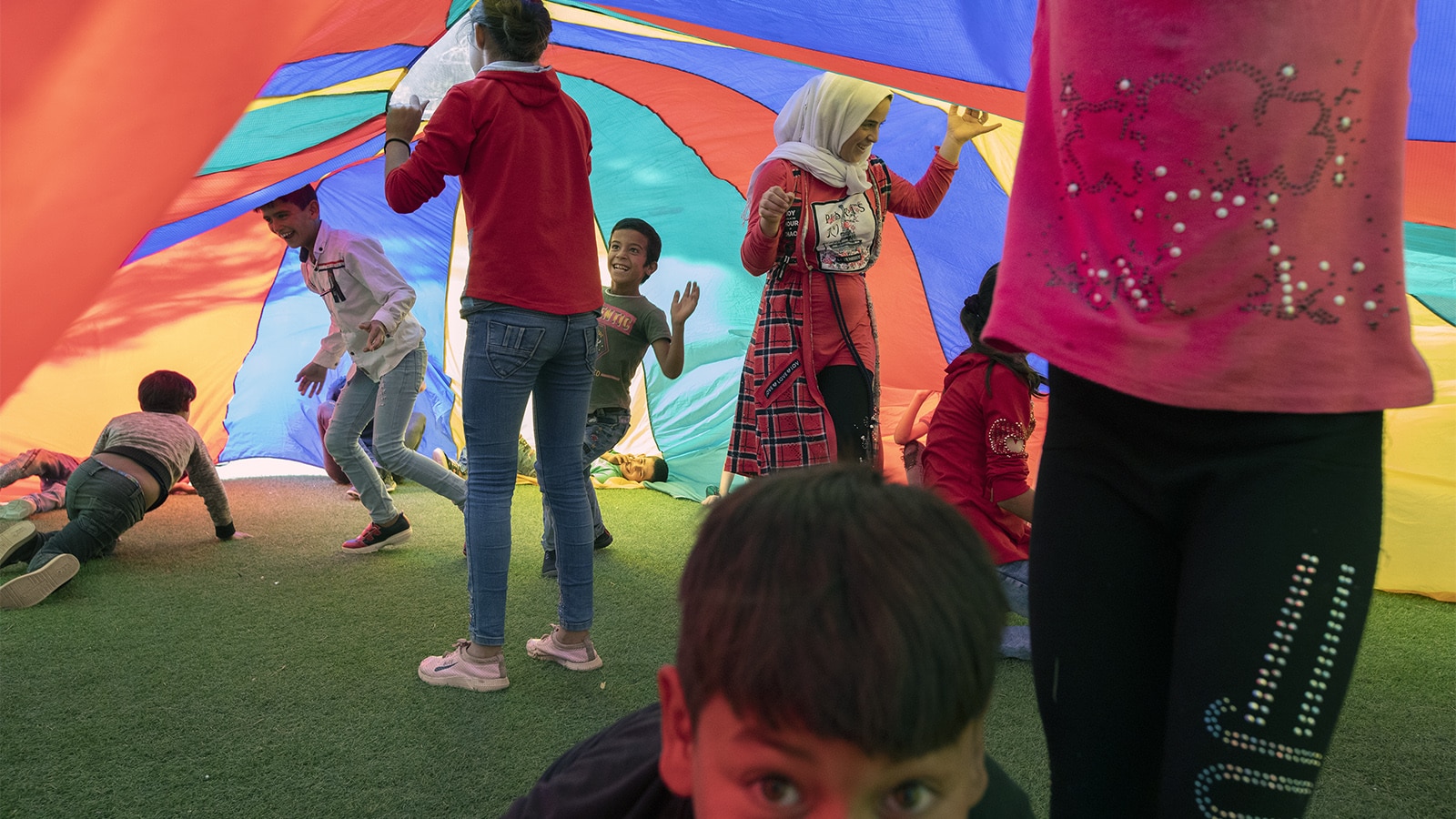
Syrian refugee youth play at a Kids Club hosted by Exodus World Service in Lebanon in Sept. 2019. Photo by Heidi Zeiger
“So many of them did want to share their stories and begged us to share their stories with others and just wanted to feel seen and heard, and it was such a deep honor to get to be with them and hear their stories,” Shuman said.
Those Exodus volunteers returned to the news that President Donald Trump was again slashing the number of refugees he would allow into the U.S. to an unprecedented low.
The State Department announced in late September that the president set the number at 18,000 refugees for the fiscal year starting in October.
That’s the lowest number of admissions a president has set since the refugee resettlement program started in the 1980s.
This past year, Trump set the refugee ceiling at 30,000 people. His first year in office, it was 45,000. Both were historic lows at the time, and the U.S. actually admitted a fraction of those numbers.
By comparison, during President Barack Obama’s last year in office, he set the number at 110,000.
As of Tuesday (Oct. 15) — when Secretary of State Mike Pompeo consults with Congress to determine that final number for the fiscal year — nearly 4,000 Americans from all 50 states had signed on to a Refugee Council USA petition asking representatives to pass legislation restoring admissions to a historic average of 95,000 refugees.
Those dropping numbers are the reason Exodus began looking for new ways to reach refugees.
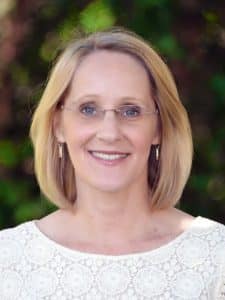
Susan Odom. Courtesy photo
“Basically, because fewer refugees are coming to us, we discerned that we need to go to them,” said Susan Odom, executive director of Exodus. “And these volunteers just have such a heart for refugees and really want to be present and let refugees know they are not forgotten and they’re cared for.”
For more than 30 years, the organization has helped volunteers from all different Christian denominations befriend refugees who have been resettled across the Chicago area, Odom said.
That includes welcoming newly arrived families, providing items for their new homes, helping refugees get to know their new communities, practicing English together and helping them study for the U.S. citizenship exam. It also includes offering informational presentations at churches and a refugee journey simulation to hundreds of interested Christians each month.
In February, Exodus organized its first Global Neighbor trip to Lebanon, partnering with a local organization called the Lebanese Society for Educational and Social Development and volunteering in a tent settlement 20 minutes from the Syrian border, Odom said.
The trip from Sept. 15 to 23 is already its third, and another is advertised on its website for June 2020. Eventually, the organization plans to expand its Global Neighbor program to additional countries, according to the executive director.
“For people that volunteer — church members across Chicagoland — to see and meet with people who are really at the very beginning of the refugee journey, they come back as greater advocates,” she said.
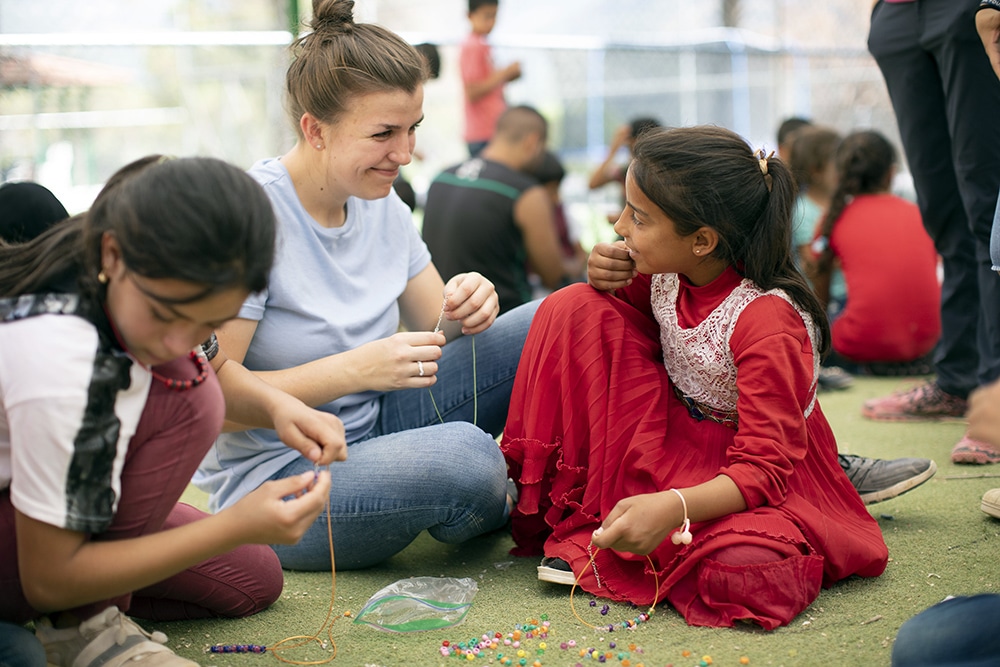
Exodus World Service volunteer Katie Schnizlein, left, interacts with a young Syrian refugee while making crafts during a visit to Lebanon in Sept. 2019. Photo by Heidi Zeiger
Katie Schnizlein of suburban West Chicago, Illinois, traveled to Lebanon on Exodus’ most recent visit just a month and a half after hearing an Exodus representative speak at a World Refugee Day event.
For the 23-year-old, who became a Christian two years ago, the experience was “life changing.”
“When you hear about something in the news or a situation or whatever the case may be, it’s a totally different thing when you’re actually with the people, hearing their firsthand account of what they’ve experienced,” Schnizlein said.
“The reality is that these people lived normal lives in their home country, in Syria, and they told us, ‘We lived as kings and queens’ and ‘We had everything.’ … And suddenly, you know, a bomb falls on your apartment building and everything changes.”
That heightened awareness was shared by others who have traveled to Lebanon with Exodus.
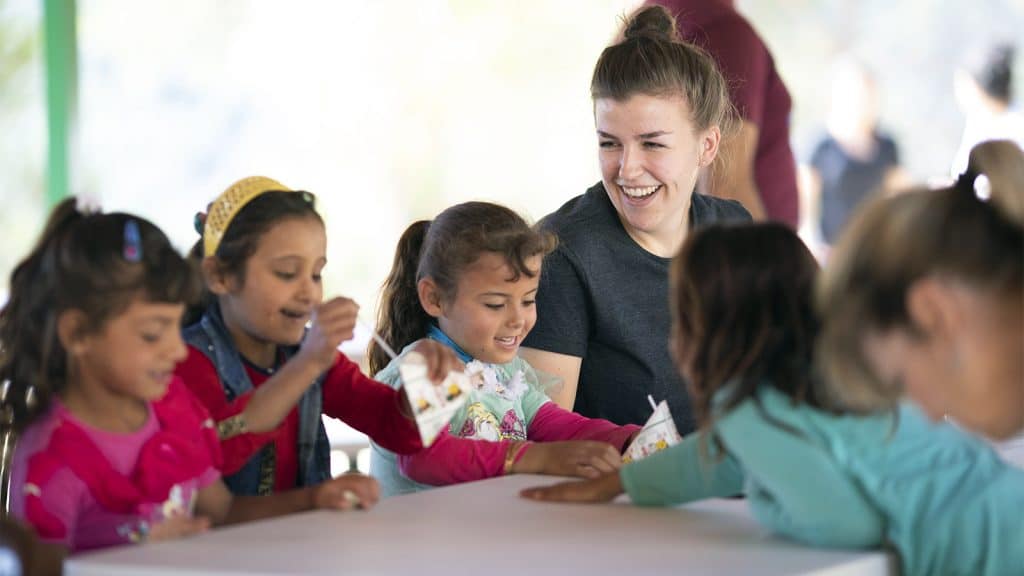
Exodus World Service volunteer Katie Schnizlein, right, interacts with young Syrian refugee girls during a visit to Lebanon in Sept. 2019. Photo by Heidi Zeiger
John Schoff, 63, was part of the pilot trip in February.
Schoff and his wife have volunteered with the organization, welcoming refugees arriving in the Chicago area since the late 1980s, he said. They’d read about its work in the bulletin at their church — St. Mark’s Church in Geneva, Illinois — and it seemed natural to get involved, since they value hospitality and know their ancestors came to the U.S. from Europe just a few generations ago.
In Lebanon, he planned games and activities for the refugee children at Kids Club — things like relay races and the especially popular thumb wrestling. Those things may seem simple, he said, but the children don’t usually have access to materials for crafts like friendship bracelets.
“It was just one small way that the team I was part of could let these kids be kids for a few days,” he said.
Schoff was so moved by the stories he heard from children and adults that he returned again with Exodus in June.
“The theme that I would summarize was, at the end of every story, people would say, ‘Please don’t forget about us. Remember us, and tell your family and friends about us,’” he said.
“It was more meaningful for me because of the continuing trends in our country to slow down the refugee flow here. So that was just a really challenging and tough part of the trip, but I would do it again and again and again to be able to hear those stories and come back and tell them.”

A female Syrian refugee, right, hugs an Exodus World Service volunteer during a visit in Lebanon. Photo by Heidi Zeiger
Shuman, who also was part of the pilot trip in February, said meeting refugees, seeing how they lived and hearing their experiences made her realize how much she did not understand about their journey — and she’s relatively familiar with the refugee program. The 37-year-old Chicagoan, who attends the nondenominational Holy Trinity Church on the city’s north side, has volunteered with Exodus’ education team for about five years, teaching cross-cultural classes, leading Bible studies and giving sermons at other churches.
As part of that work, she often asks people to imagine what they would carry with them if they had to flee the country as a refugee.
Then she met a woman in Lebanon who shared that the only thing she carried with her as she fled on foot about 200 miles through the mountains between Lebanon and Syria were her two small children.
It was a humbling experience, Shuman said, realizing there was little she could do to fix the problems people faced.
But she could listen to the heartbreaking stories many refugees wanted to tell, shared through a translator. She could, she said, show them they’re important and they’re not forgotten. She could share a bond with other mothers, snuggling their newborns. And she could hear the hope in their voices.
“We just really need to hear stories,” she said.
“We can hear data and we distill people down to some sort of definition or status that we don’t even understand the nuances of. But these are people, and we need to hear their stories, and it’s the only way we can at least begin to start to value them in any way near what God values them for.”
See also:

